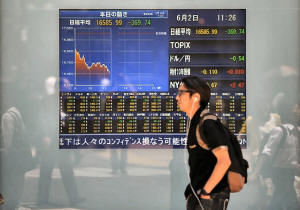|
World stocks fall for fifth straight day
on trade fears
 Send a link to a friend
Send a link to a friend
 [September 06, 2018]
By Ritvik Carvalho [September 06, 2018]
By Ritvik Carvalho
LONDON (Reuters) - World shares fell for a
fifth straight day on Thursday as investors braced for another
escalation in a trade war between the United States and China, while
emerging-market currencies paused near 15-month lows.
The MSCI All-Country World Index, which tracks shares in 47 countries,
was down 0.1 percent. Stocks in Europe opened lower, with the
pan-European STOXX 600 index losing 0.1 percent. [.EU]
Wall Street was set to open lower. [.N]
The main worry for investors was the end of a public consultation period
on Thursday for U.S. President Donald Trump's plan to impose tariffs on
an additional $200 billion of Chinese goods.
Trump said on Wednesday trade talks with China would continue but the
United States was not yet ready to come to an agreement.
"In summary, I think equity investors are too cautious, which is
surprising because the U.S. market is hitting all-time highs," said
Eddie Perkin, chief equity investment officer at Eaton Vance.
"People are too worried about trade wars, so I am inclined to add a bit
of risk in export-oriented industrial companies and emerging market
equities."
Earlier in Asia, MSCI's broadest index of Asia-Pacific shares outside
Japan dropped more than 1 percent to a one-year trough of 515.24 points.
It was last down 0.7 percent.
Japan's Nikkei slipped 0.4 percent and Australian shares dropped 1.1
percent. China's blue-chip index fell 1.1 percent, Hong Kong's Hang Seng
index 1 percent.
Further weighing on sentiment, data out earlier showed German industrial
orders fell unexpectedly in July, another sign that factories in
Europe's largest economy are feeling the bite of protectionist trade
politics.

Investors are also watching for developments as the United States and
Canada resume talks about revamping the North American Free Trade
Agreement. Canada insisted there was room to salvage the pact despite
few signs a deal was imminent.
The dollar, considered a safe haven at times of turmoil because of its
status as the world's reserve currency, has generally benefited from the
trade conflicts. It has gained 8 percent since the end of March, with
currencies in emerging markets taking a hammering.
But measured against a basket of currencies, the dollar retreated from
the two-week highs it reached earlier this week to stand 0.1 percent
lower at 95.09.
The euro was a tad stronger at $1.1628.
Sterling held on to gains made on Wednesday as investors positioned for
a favorable Brexit outcome [GBP/]. It was last up 0.1 percent at
$1.2920.
[to top of second column]
|

A man walks in front of a screen showing today's movements of Nikkei
share average outside a brokerage in Tokyo, Japan, June 2, 2016.
REUTERS/Issei Kato/File Photo

Emerging markets have been hit by the financial crises in Argentina
and Turkey. In Indonesia, the central bank has had to intervene
several times in recent weeks to stem the rupiah's slide.
Indonesia's benchmark stock index was last up nearly 1.6 percent
while the rupiah also gained a tad.
MSCI's index of emerging market currencies, which had earlier paused
near 15-month lows, was up 0.1 percent on the day after two straight
days of heavy declines.
But analysts warned of further losses because investors were no
longer looking at Argentina, Turkey and South Africa as isolated
cases. They were fretting over the impact of rising U.S. inflation
and interest rates on heavily indebted economies.
"As global monetary conditions slowly tighten, the global economic
cycle rolls over and the U.S. President disturbs the global trade
cycle, there's definitely more to the EM sell-off than a few
unrelated spots of weakness," wrote strategists at Societe Generale
in a note to clients.
The emerging market equity index has been crunched in the past month
or so, falling for six consecutive sessions and down more than 3
percent this week.
A range of factors have hit the stocks: policy tightening by the
U.S. Federal Reserve, the crises in Turkey and Argentina, the
Sino-U.S. trade war and broader concerns about China's economy.
In commodities, oil prices rose, encouraged by a weaker dollar and
evidence of strong U.S. fuel demand. U.S. crude rose 0.1 percent to
$68.79 a barrel. Brent was last up 0.3 percent at $77.50. [O/R]
Gold was stronger with spot gold up 0.8 percent at $1,205.87 an
ounce.
(Reporting by Ritvik Carvalho; additional reporting by Danilo Masoni
in Milan, Julien Ponthus, Sujata Rao and Kit Rees in London ,and
Swati Pandey in Sydney; Editing by Janet Lawrence)
[© 2018 Thomson Reuters. All rights
reserved.]
Copyright 2018 Reuters. All rights reserved. This material may not be published,
broadcast, rewritten or redistributed.
Thompson Reuters is solely responsible for this content. |